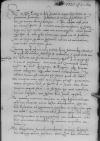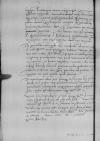Letter #3592
Mauritius FERBER to Ioannes DANTISCUSHeilsberg (Lidzbark Warmiński), 1535-05-04
| received [1535]-05-09 Manuscript sources:
Prints:
| ||||||||||
Text & apparatus & commentary Plain text Text & commentary Text & apparatus
Reverendissimo in Christo Patri et Domino, domino
Reverendissime in Christo Pater et Domine, frater et amice carissime ac plurimum honoran(do).
Salutem et omnem felicitatem cum mei ex animo commendatione.
Redditae mihi sunt per nuntium Reverendissimae Dominationis Vestrae litterae eius humanissimae et sinceri erga me, immo mutui inter nos, amoris testes. Omnium primum ago Reverendissimae Dominationi Vestrae gratias plurimas, quod me et sententiae suae et rerum
Ceterum quod ad res communis patriae bene statuendas attinet et quod ab omnibus statibus et ordinibus, si quid recte confici debeat, conveniendum esse putem on the margin, in the hand of other⌈conveniendum esse putemconveniendum esse putem on the margin, in the hand of other⌉, iam sententiam meam Reverendisimae Dominationi Vestrae perscripsi, in qua et persevero. Locum autem
De querelis coctionis cerevisiae ac aliis difficultatibus in nullo non conventu aures nostrae obtunduntur. Ceterum dominos palatinos et capitaneos quosdam in culpa esse, quis non videt? Qui conniventibus ferme oculis haec omnia pertranseuntes in transgressores non animadvertunt, sibi plus quaerentes commodare quam communi rei publicae consulere etc.
De obligatione sua ob extraditionem pecuniae dispensatori  BCz, 1595, p. 738burgensis palatinus
BCz, 1595, p. 738burgensis palatinus
De
De ceteris, cum talia sint pleraque omnia, quae litteris vel comprehendi, vel confici nequeant, in communem conventum aut particularem quempiam congressum nostrum supersedendum esse visum est mihi iuxta atque Reverendissimae Dominationi Vestrae.
Nova, quae scriptu digna essent, quaeque Reverendissima Dominatio Vestra ignorare posset, apud me ad praesens non sunt. Unum, quod reliquum est, Reverendissimam Dominationem Vestram salvam et florentem esse, laetamque vivere, ex animo opto et cupio me illius fraterno amori ac benevolentiae commendando.
Ex
Reverendissimae Dominationis Vestrae totus


